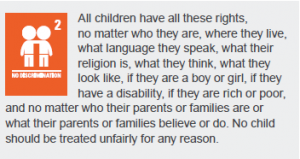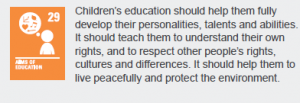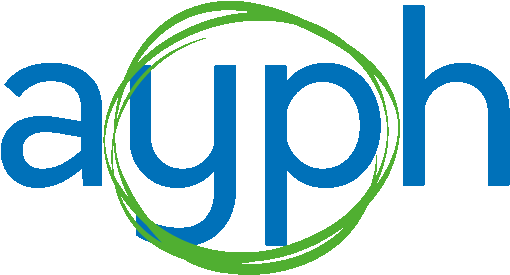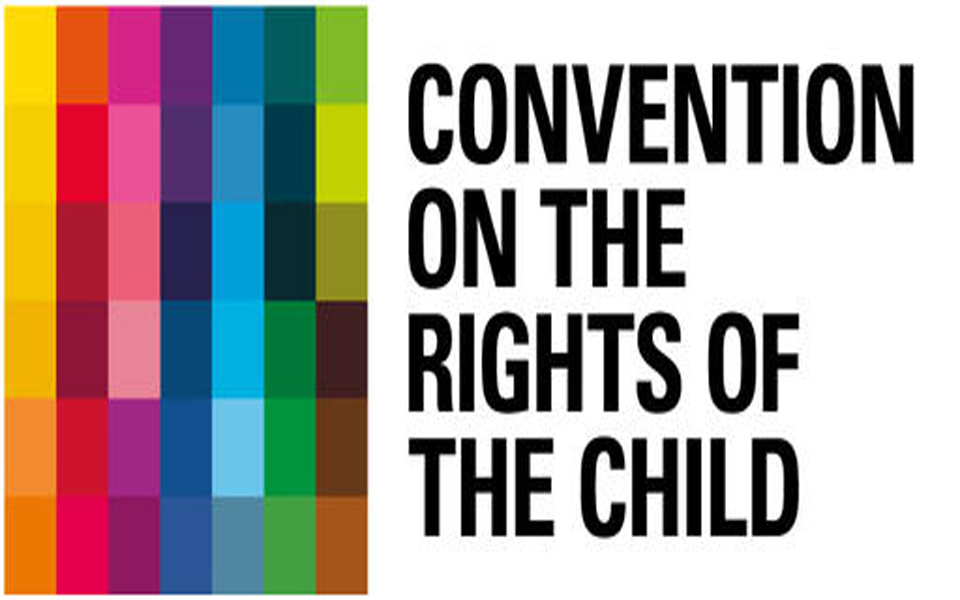We asked the two AYPH Youth Advisers on our We’re All Right project to share their thoughts about the state of young people’s rights and how they think we should improve it.
2019 marked the 30th anniversary of the UN General Assembly adopting the United Nation Convention on the Rights of the Child (UNCRC). It was an ambitious document, covering everything from housing and health to identity and freedom of expression. It was also radical, extending Human Rights to everyone under 18 in order to redress some of the power imbalance between adults and young people. In 1991 it was partially ratified in the UK – it was only fully ratified in 2008. As early as 1995, the Committee on the Rights of the Child raised concerns about the high levels of child poverty and economic inequality in the UK, as well as its unequal treatment of children and young people in custody or seeking asylum.
Ratifying the Convention could have driven the UK to continually improve the lives of all young people. After all, we’ve known for years that childhood trauma and poverty create health inequalities that can reverberate for a lifetime. Instead, child poverty and homelessness have increased over the last 10 years. So despite the UK being bound by international law to protect and promote all children’s rights, young people’s access to these rights has deteriorated.
In light of this, we decided to interrogate what it actually means to be signed up to the UNCRC on its 30th anniversary. In particular, how this international legislation affects – or doesn’t – the lives and health of young people in the UK. We asked the two Youth Advisers on our We’re All Right project to share their thoughts about the state of young people’s rights and how they think we should improve it. They both highlight that it is the duty of adults and people in power to promote and uphold children and young people’s rights. Since we haven’t done so well in the past, we should start listening to what young people say will help them claim their rights in the future.
Laura Clarke, 23
 Human Rights violations, though relevant to us all, are commonly misunderstood as the result of a lack of awareness and education. Whilst we are aware and often angered by the breach of rights portrayed in the news and on social media, these “headline worthy”, viral examples may in fact distance us from the day-to-day stories – the quiet hum – of our most basic rights not being met.
Human Rights violations, though relevant to us all, are commonly misunderstood as the result of a lack of awareness and education. Whilst we are aware and often angered by the breach of rights portrayed in the news and on social media, these “headline worthy”, viral examples may in fact distance us from the day-to-day stories – the quiet hum – of our most basic rights not being met.
Depending on who you ask, our world is either at its most progressive, empowering and liberating or regressing into our history — intolerance and oppression bubbling to the surface, refusing to stay silent any longer. (Your own opinion on this matter may well indicate the level of privilege you possess.) What this means, in relation to rights, is that our perception is flawed. Are news stories showcasing the frequency and extent to which rights are violated in the modern day or are they a result of the high standards we now hold ourselves to? Newsworthy for their rarity?
Media influences and shapes our perception of society. When the stories reported are shocking, unrelatable and distant, we perhaps don’t recognise the less sensational, but similar, aspects of our own lives. To many, a violation of rights is a child in the developing world with no access to clean water or education. This clear breach of fundamental rights evokes shock and sadness but can also minimise, and detract from, the experiences of our peers. To view rights violations as sensational and happening far away overlooks the subtle but common breaches of rights experienced by your colleagues, your family and even you.
Our project, We’re All Right, seeks to demonstrate the importance of knowing your rights — and knowing when they are being violated — to survivors of sexual violence. When one has undergone trauma rights have already been violated, and for many, continue to be ignored and disregarded during the process of recovery. We all have the right to clean water, to food, to education — this we know. What gets missed in the headlines and the hashtags is the rape victim waiting eighteen months for counselling despite her right to receive timely and appropriate support. Or the college student forced to either drop out or attend the same classes as their abuser, violating their right to both education and recovery from trauma. Article 42 of the UNCRC expresses that the government must actively work to help children and adults know and understand these rights, yet so many people still have little to no knowledge of what their rights are, let alone when they are being violated.
Rights violations are ever present. And while we may hear it on the news and read about it online, it is not as distant as we may wish. The shocking stories that we empathise with so greatly are the result of a snowball effect — small breaches that build and build until they can no longer be ignored and make their way onto our screens. By knowing our rights and how to demand them for ourselves and others, we can prevent the snowball from becoming an avalanche.
Amy Mary Rose Herring, 22
 As demonstrated in Laura’s post, a violation of rights is not as drastic as it sounds and happens every day. The problem is that as a society we have normalised the violation of young people’s rights and accepted it as part of everyday life. My opinion is that there is a lack of empowerment around rights and more importantly, a lack of accountability or action in response to these everyday violation of rights.
As demonstrated in Laura’s post, a violation of rights is not as drastic as it sounds and happens every day. The problem is that as a society we have normalised the violation of young people’s rights and accepted it as part of everyday life. My opinion is that there is a lack of empowerment around rights and more importantly, a lack of accountability or action in response to these everyday violation of rights.
Are young people aware that being denied food or family is as much of a violation as being denied access to clean water or safety from war? We have seen evidence over the past year of young people being denied their right to food but nothing happens and no one is held accountable. In theory, the Government is meant to be held accountable for the violation of this right. But what does accountability even mean and what does effective accountability look like? How can young people hold individuals or authorities to account for the denial of their rights?
Article 43 states that adults (as well as the Government) have the duty to educate and empower young people about their rights. Sometimes young people do not know more than 10 of their rights. This is a clear indicator that we are failing young people. There are some really simple ways of educating young people about their rights:
- displaying posters about rights around classrooms or spaces occupied by young people
- incorporating rights into lesson plans or running specific lessons on the UNCRC
- having discussions with young people about how they perceive their rights
- pointing out to young people when their rights are being denied
The other challenge we face is around how to empower young people to use their voice and stand up for not only their own but also their peers’ rights. When young people see that they are being denied their rights and do speak up – quite often nothing happens. Millions of children over the last few years have spoken up about their rights being denied, yet there are no improvements. This leads us back to the issue of accountability. When no action is taken by adults after being made aware of a denial of rights, young people’s rights will continue to be denied.
After 30 years, we still need the UNCRC, but it’s ineffective if we live in a society where young people’s rights are not being protected and there is no justice when they are denied.

